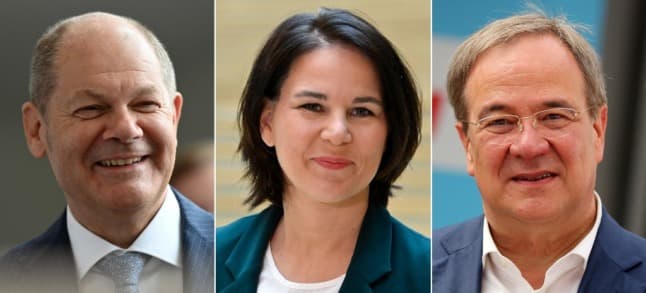Germany's SPD extends lead over CDU/CSU as Greens lose ground: poll

With just three weeks to go until the federal election, Germany's Social Democrats are extending their lead against the conservative CDU/CSU party union whose support has hit a fresh historic low.
Support for the SPD has gained a percentage point in the last week and now stands at 25 percent, according to the latest INSA poll published by Bild am Sonntag newspaper on Sunday.
The CDU and CSU with Armin Laschet as their candidate for chancellor achieved 20 percent in total, down one percentage point on last week and another historic low, according to Bild.
The Greens - with chancellor candidate Annalena Baerbock - lost one percentage point to 16 percent, followed by the FDP in fourth place, unchanged at 13 percent.
Several other polls also showed the SPD above the CDU/CSU, significantly so in some cases.
According to television station ZDF's political barometer - published Friday - the Social Democrats stood at 25 percent and the Union at 22 percent, German paper Die Welt reported.
And the below chart from Wahlrecht.de shows what the outcome would have been had the election been this Sunday, according to various recent polls, including the INSA one published by Bild.
The SPD is ahead of the CDU-CSU in all of the five most recent polls (highlighted in pink).

Laschet, the 60-year-old leader of Merkel's CDU-CSU alliance had gone into the election race with a comfortable lead over his rivals from the Social Democratic Party (SPD) and the Greens.
But several missteps in the last weeks have left his popularity in the doldrums and support for his party slipping just as Merkel is due to bow out of politics after 16 years as German leader.
Currently state premier of North Rhine-Westphalia, Laschet saw the tide turn against him during the deadly floods that struck western Germany in mid-July.
Caught on camera chuckling behind in the background with local officials while Germany's president gave a speech mourning victims of deadly floods, Laschet has since been unable to halt a falling trend in popularity.
READ ALSO: German chancellor candidate Laschet sparks anger with flood zone laughter
READ ALSO: Gaffe-prone Merkel heir with big shoes to fill
Comments
See Also
Support for the SPD has gained a percentage point in the last week and now stands at 25 percent, according to the latest INSA poll published by Bild am Sonntag newspaper on Sunday.
The CDU and CSU with Armin Laschet as their candidate for chancellor achieved 20 percent in total, down one percentage point on last week and another historic low, according to Bild.
The Greens - with chancellor candidate Annalena Baerbock - lost one percentage point to 16 percent, followed by the FDP in fourth place, unchanged at 13 percent.
Several other polls also showed the SPD above the CDU/CSU, significantly so in some cases.
According to television station ZDF's political barometer - published Friday - the Social Democrats stood at 25 percent and the Union at 22 percent, German paper Die Welt reported.
And the below chart from Wahlrecht.de shows what the outcome would have been had the election been this Sunday, according to various recent polls, including the INSA one published by Bild.
The SPD is ahead of the CDU-CSU in all of the five most recent polls (highlighted in pink).

Laschet, the 60-year-old leader of Merkel's CDU-CSU alliance had gone into the election race with a comfortable lead over his rivals from the Social Democratic Party (SPD) and the Greens.
But several missteps in the last weeks have left his popularity in the doldrums and support for his party slipping just as Merkel is due to bow out of politics after 16 years as German leader.
Currently state premier of North Rhine-Westphalia, Laschet saw the tide turn against him during the deadly floods that struck western Germany in mid-July.
Caught on camera chuckling behind in the background with local officials while Germany's president gave a speech mourning victims of deadly floods, Laschet has since been unable to halt a falling trend in popularity.
READ ALSO: German chancellor candidate Laschet sparks anger with flood zone laughter
READ ALSO: Gaffe-prone Merkel heir with big shoes to fill
Join the conversation in our comments section below. Share your own views and experience and if you have a question or suggestion for our journalists then email us at [email protected].
Please keep comments civil, constructive and on topic – and make sure to read our terms of use before getting involved.
Please log in here to leave a comment.